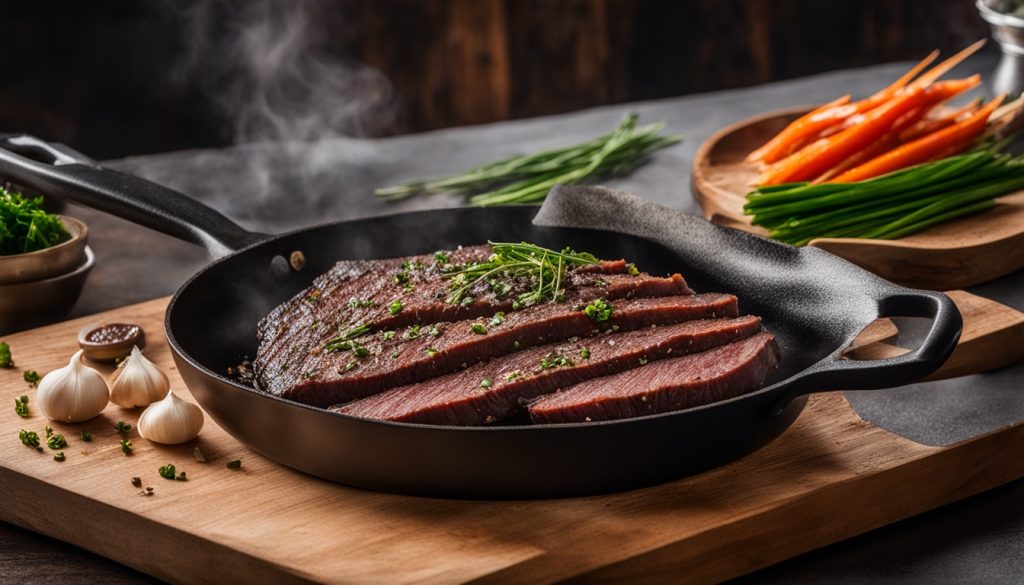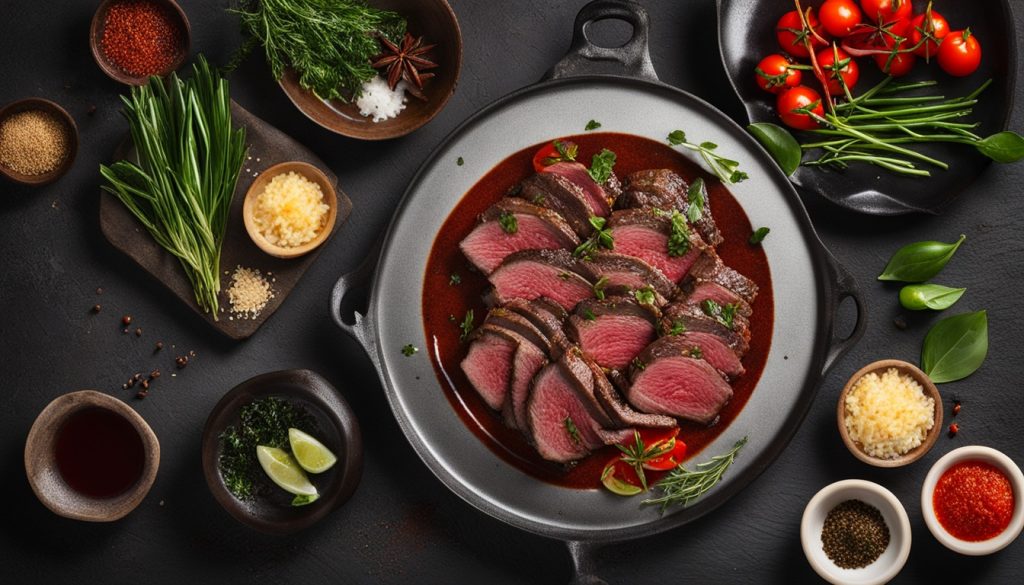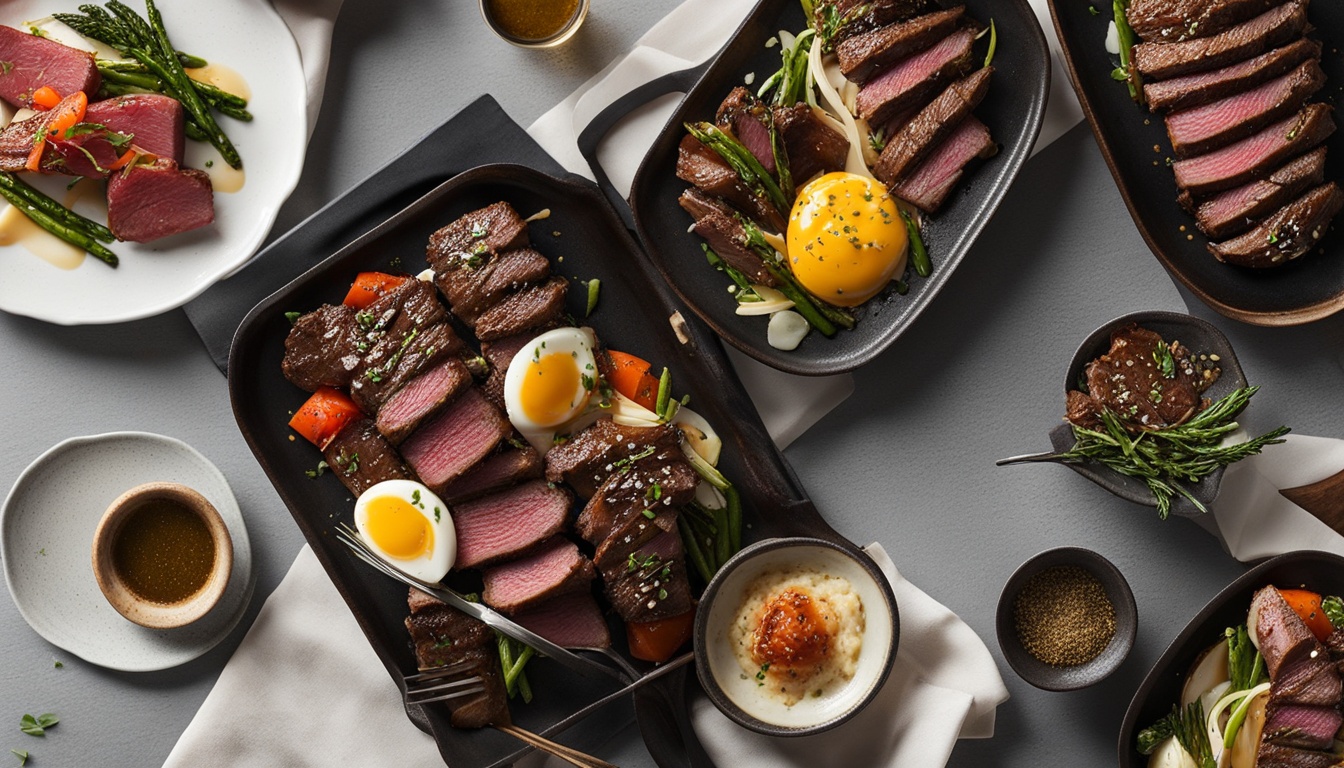Wagyu beef is a very rare choice, making up less than 0.1% of the world’s beef. This makes it special, known for its melt-in-your-mouth feel. Cooking thin-sliced Wagyu beef perfectly takes a lot of care. From the type of pan to how you fry it, everything matters.
Many home chefs want to know the best way to cook this beef. They aim to get the most flavor out of its rich fat. The trick is in the cooking methods. You can cook these 1cm-thick slices just right on a cast iron or carbon steel pan. Or, for the most precise cooking, use a sous vide machine.
Key Takeaways
- Wagyu beef is a rare and luxurious delicacy.
- Optimal cooking methods include cast iron, carbon steel, or sous vide.
- Achieving the perfect texture involves careful balancing of the beef’s rich fat.
- The delicate, melt-in-your-mouth texture is the hallmark of thin-sliced Wagyu beef.
- Using specific pans and precise temperatures can significantly enhance the final taste.
Understanding the Unique Qualities of Wagyu Beef
Wagyu beef is known worldwide for its rich marbling and how it’s raised. The high marbling leads to a tender, juicy, and flavorful meat. Wagyu beef is popular in top dining spots for good reason.
It’s not just the marbling that’s special. The way Wagyu cattle are raised plays a big role too. They are fed carefully and the fats in the meat are good for you. These efforts make Wagyu beef taste amazing and feel soft when you eat it.
What Makes Wagyu Beef Unique
What really sets Wagyu beef apart is its marbling. This marbling makes the beef very soft and it seems to melt in your mouth. The marbling in Wagyu beef is mostly made up of good fats.
These fats add a buttery taste but are also better for your heart health. Special traditions in Japan, like massages and a diet that includes beer and sake, make Wagyu beef stand out even more.
Different Grades of Wagyu Beef
Wagyu beef is graded carefully to show its quality. The top grade, A5, means the meat has the best marbling and texture. This high grade ensures every piece meets strict quality standards.
But even A4 Wagyu is highly prized. It offers great flavor but is more affordable. This makes it a top choice for cooks and those who love fine food.
Choosing the Right Cut for Thin Slices
Key to a tasty Thin Sliced Wagyu Beef Recipe is picking the right cut. The flavor and texture come from the cut’s marbling. We’ll explore the best cuts for your dish.
Popular Cuts for Thin Sliced Wagyu
Sirloin, ribeye, and fillet top the list for thin slices. They are known for their tenderness and rich marbling. Perfect for recipes like shabu-shabu and sukiyaki, they offer a soft, rich taste.
How to Select and Store Wagyu Beef
Start by buying from trusted sellers for top-notch Thin Sliced Wagyu Beef Recipe. Choose cuts with even marbling and a bright color. Also, correct storage is key. Thaw in the fridge slowly to keep the beef’s goodness. Stay away from quick thawing methods like microwaving to keep the meat quality high.
- Choose cuts with consistent marbling for even flavor distribution.
- Store beef correctly to maintain its integrity.
- Thaw gently in the refrigerator to prevent texture degradation.
Adhering to these Wagyu Beef Cooking Techniques helps keep your Wagyu beef sliced thin, high-quality, and memorable.
Preparing Your Wagyu Beef Slices
For the best cooking outcome, getting your Wagyu beef slices ready right is vital. Stick to these steps to get the most out of your dish.
Thawing and Bringing to Room Temperature
Defrosting your Wagyu beef slices in the fridge overnight is key. It keeps the meat’s quality and taste. After thawing, let the slices sit out for 30 minutes. This brings them to the right temperature for cooking, ensuring a deep flavor.
Seasoning Your Wagyu Beef
Remember, with Wagyu beef, a little seasoning goes a long way. Use just a bit of sea salt and cracked black pepper. Too much seasoning can mask the beef’s delicious taste. A light touch enhances the meat’s rich flavor without hiding it.
Selecting the Right Cooking Oil
Picking the right oil is essential in the Wagyu Beef Cooking Guide. Go for oils that can handle high heat, like vegetable or avocado oil. Butter and olive oil burn easily and spoil the taste of the beef. A pan that spreads heat well is also crucial. It stops the slices from bunching up and ensures a great sear.
By following these Wagyu Beef Cooking Methods, you’ll bring out the unique, luxurious taste of Wagyu beef. It sets the stage for a fine dining experience.
Thin Sliced Wagyu Beef Recipe: How to Cook Perfectly Every Time
Cooking thin-sliced Wagyu beef perfectly needs special methods. Each method shows off the beef’s luxury. This guide will help you master pan-searing, grilling, and sous vide cooking for your Wagyu.
Pan Searing Wagyu Beef
Pan-searing Wagyu needs a hot cast-iron skillet and oil. Use an oil with a high smoke point, like avocado oil. When the oil shimmers, add the beef slices. Cook them for 1-2 minutes on each side. This creates a golden-brown crust, keeping the beef juicy.

Grilling Thin Sliced Wagyu
To grill Wagyu, first heat the grill high and add wood chips for flavor. Put the slices on the grill for 1 minute each side. This method adds a smoky taste and keeps the beef tender.
Sous Vide Technique
Sous vide gives precise cooking. Seal the Wagyu slices and cook at 132°F for 2 hours. Sear them quickly after in a skillet with oil. This technique cooks evenly, brings out the flavor, and keeps the beef moist.
Using these techniques, you can make your Wagyu beef slices stand out. Try pan-searing, grilling, or sous vide for an unique taste experience. These methods bring the rich, buttery flavor Wagyu is famous for.
Serving and Pairing Suggestions
Serving thin-sliced Wagyu beef can make your meal extra special. It’s even better when you pair it with the right sides. This can make the flavors of the Wagyu beef really stand out. Here are some tips for a great meal.
Resting and Slicing Instructions
Let the Wagyu beef rest for five minutes after cooking. This will make the meat more juicy and flavorful. Always slice the beef against the grain. Doing this keeps the meat tender. Remember these Wagyu Beef Cooking Tips to make your meal great.
Side Dishes to Complement Wagyu Beef
Choose sides that bring out the rich taste of Wagyu beef. Here are some good options:
- Light salads with vinaigrettes
- Roasted vegetables
- Mashed potatoes
These sides add different tastes and textures. They help your Wagyu Beef Recipe Ideas look and taste amazing.
Wine Pairings
The right wine can make eating Wagyu beef an even better experience. Choose full-bodied red wines like Cabernet Sauvignon. They go well with the beef’s rich flavors. For those who like white wine, a crisp Chardonnay is a great choice. It offers a nice, light taste. These wines can make your meal more enjoyable and add something special to your food journey.
Use these Wagyu Beef Cooking Tips to make every part of your meal special. From resting and slicing the meat, to picking the best sides, everything should be delicious. Enjoy the amazing flavors of Wagyu beef with the right pairings and serving techniques for a meal you’ll always remember.
Tips for Cooking Thin Sliced Wagyu Beef
Getting a perfect cook on thin Wagyu beef requires precision and care. You must pay close attention because of the meat’s high marbling. Follow these tips to make sure your Thin Sliced Wagyu Beef Recipe always comes out excellent.

Avoiding Common Mistakes
Overcooking is a big issue with *Perfect Wagyu Beef Cooking*. Wagyu’s high fat content means it cooks faster than usual. Watch the cooking time closely and use a meat thermometer if needed. Also, be careful of using too much seasoning. A light touch with staples like sea salt and pepper is usually enough.
Expert Tips for Perfect Cooking
Preheating your cooking surface is key, experts say. This is true whether you’re using a pan or grill. A hot cooking surface helps get that sear just right. Drying the meat with a paper towel before cooking leads to quicker, more uniform cooking. Trim any extra fat, then use it to cook. This approach boosts flavor without extra oils or butter. And don’t forget, thin slices cook fast. So, you’ll need to adjust timing and temperature to get the doneness you want.
Conclusion
Mastering Wagyu beef starts with understanding what makes it special. This beef is known for its marbling and rich flavor. Choosing the right cut, from sirloin to fillet, is key. It ensures you get the most out of this prized meat. How you prepare it, from thawing to seasoning, is crucial for a great meal.
To cook Wagyu well, you need to know different methods. This includes pan-searing, grilling, and sous vide. Each way brings out the meat’s unique taste and texture. For example, grilling adds a smoky flavor. Sous vide keeps the meat tender. Learning Wagyu beef cooking isn’t just about steps. It’s about feeling how the meat reacts when cooked.
Serving and pairing are important for a great Wagyu beef meal. Letting the meat rest and cutting it the right way keeps it juicy. The right side dishes and wine choice can make your meal unforgettable. Serving Wagyu with fresh salads, roasted veggies, and the right wine lets the beef’s flavor shine.
Following these tips helps you make top-quality Wagyu beef meals. Whether you love cooking at home or you’re an expert, these guidelines are your recipe for success. They lead to dishes that melt in your mouth every time.











